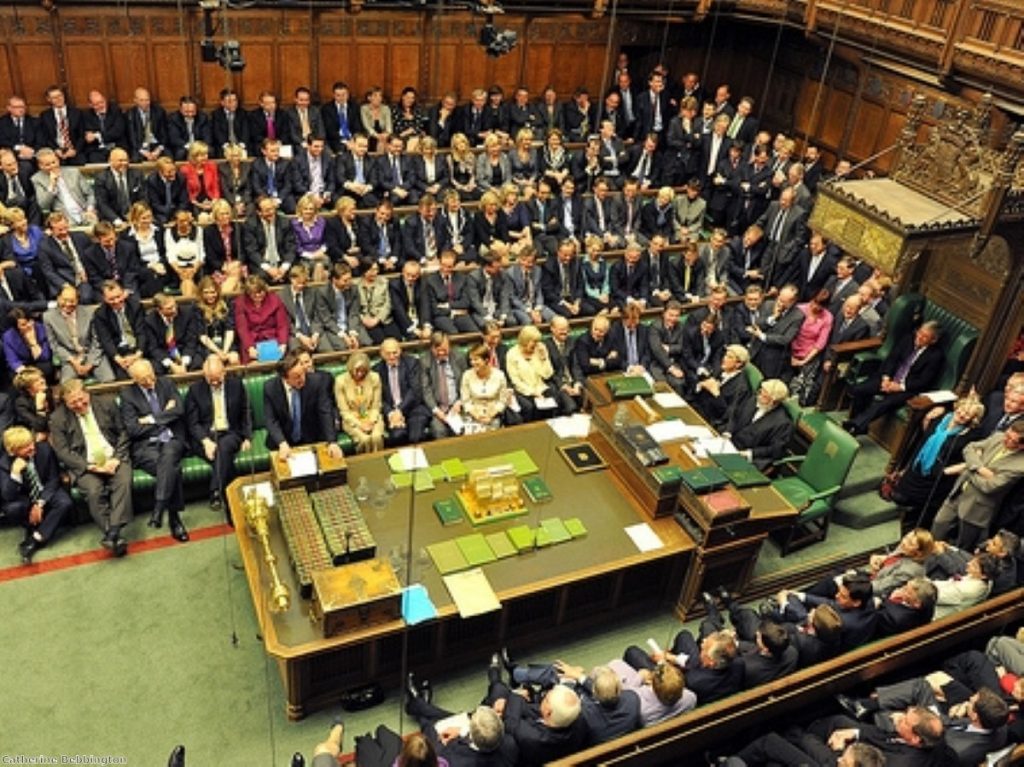NHS reform: Commons scene of ‘worst tempered debate’
By Ian Dunt Follow @IanDunt and Alex Stevenson Follow @alex__stevenson
A debate on the publication of an NHS risk register has been branded the "worst tempered" session of his tenure by the deputy Speaker.
The comment came after a Tory MP called shadow health secretary Andy Burnham a "scaremongering buffoon" – a remark which was later retracted after deputy Speaker Nigel Evans demanded it.
He later commented: "In my time as deputy speaker this is easily, by some margin, the worst tempered debate I have chaired.


"Can I ask members on both sides to lower the temperature?"
At the opening of the debate, Mr Burnham warned there was a warning of fatalities in the NHS as a result of Andrew Lansley's reforms, but the government was nevertheless blocking the publication of a risk register into the reorganisation plan.
"To press on regardless would be unforgivable but that is just what they plan to do," he said.
"The prime minister is surrounding himself with people who will say what he wants to hear. He won't listen to the doctors and nurses he was once so keen to have his photo taken with.
"Not a single member on those benches who is shouting at me now can look their constituents in the eye and say 'I said I'd bring forward a major NHS reorganisation'."
Health secretary Mr Lansley replied: "We've opened up more information about NHS services than ever done under the last government."
If risk assessments were published it would lead to a reduction in quality of the advice given to ministers, Mr Lansley argued.
The report "is deliberately negative", he continued.
"It is not a balanced document. Where is the balanced document on the bill? It is the impact assessment. It captures not only the same risks but it puts them alongside the benefits."
Labour sought to convince Liberal Democrats to back them on the vote. The party has a long track record on freedom of information issues and the information commissioner has demanded the report is published in the public interest.
The Department of Health appealed that decision, which will now go to a tribunal.
There were signs Labour's plan to separate the coalition was working during the debate, with one Liberal Democrat MP asking the health secretary why he was pressing ahead with reforms if he believed the current "outcomes were never better".
Deputy Liberal Democrat leader Simon Hughes said the government was behaving according to the letter of freedom of information laws by responding to the tribunal where there is a disagreement between the information commissioner and ministers.
But Mr Lansley refused to confirm whether he would publish the document even if the tribunal found in the information commissioner's favour.
The government won the vote with a majority of 53.
Mr Burnham had come under intense criticism when Tory MPs accused him of refusing to publish a similar document when he was health secretary. He told the Commons it had in fact been a strategic register and that he was not overruled by the information commissioner.
Meanwhile, a group of hugely influential medical leaders came together this morning to pile on further pressure against the coalition.
Hamish Meldrum, leader of the British Medical Association (BMA), Dr Clare Gerada, chair of the Royal College of GPs, and Dr Peter Carter, the Royal College of Nursing's chief executive, were among the signatories to an open letter to minsters demanding the register be published.
PMQS clash
David Cameron was keen for the issue to be debated in prime minister's questions this lunchtime, as he produced Labour's briefing note to embarrass the opposition frontbench.
This showed that Mr Burnham had himself blocked the publication of the risk register in 2009, when he was in charge in the Department of Health. Mr Cameron said Labour were "opportunist" and "not fit for government".
Mr Miliband, who had attacked the coalition's NHS reforms more generally, warned they were set to dominate Mr Cameron's place in the history books.
"This will become his poll tax," he said. "He should listen to the public. He should drop this bill."
The prime minister responded by attacking Mr Miliband's leadership, quoting blogger Alex Hilton's own criticisms of the Labour leader. He had written: "You are not articulating a vision or a destination, you're not clearly identifying a course and no-one's following you."
Mr Cameron concluded: "I couldn't have put it better myself."
NHS reform controversy continues
Even if the government can win today's vote, manoeuvres at a grassroots Lib Dem level pose a new threat to the health and social care bill.
Activists are tabling a motion demanding that all clauses to do with extending competition should be scrapped for their spring conference – the same event which last year triggered the pause in the legislation when it roundly rejected the reforms.
The new motion follows an intervention from Lady Williams, who has led Lib Dem opposition to the bill in the Lords. The Lib Dem said the sections on competition need to be removed before the bill can be passed – a position not altogether different from Labour's.
"The government has totally failed to convince either the public or NHS staff that the NHS will be improved by the bill," the motion reads.
"The implementation of the bill is disruptive and distracting to efforts to achieve the unprecedented efficiency savings required of the NHS each year. The bill will make essential restructuring of hospital services and true integration of health and social care more, not less, difficult."
It goes on: "Conference believes that the government amendments to the bill announced at report stage in the House of Lords in February and March 2012 do not reflect Liberal Democrat policy or the coalition agreement."
There is a chance the party's federal conference committee will reject the emergency motion, however.












